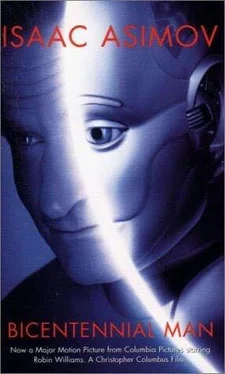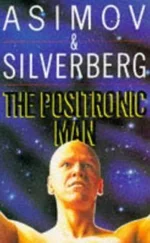“Time machine,” he gasped.
The other man stiffened. He said, “Do you read pseudoscientific romances?”
“What?” said Weill.
“Have you read H. G. Wells’s The Time Machine ?”
The repetition of the phrase seemed to soothe Weill a bit. The pain in his head lessened. The name Wells seemed familiar, or was that his own name? No, his own name was Weill.
“Wells?” he said. “I am Weill.”
The other man thrust out a hand. “I am Hugo Gernsback. I write pseudo-scientific romances at times, but of course, it is not right to say ‘pseudo.’ That makes it seem there is something fake about it. That is not so. It should be properly written and then it will be scientific fiction. I like to shorten that”—his dark eyes gleamed—“to scientifiction.”
“Yes,” said Weill, trying desperately to collect shattered memories and unwound experiences and getting only moods and impressions. “Scientifiction. Better than pseudo. Still not quite—”
“If done well. Have you read my ‘Ralph 124C41 +’?”
“Hugo Gernsback,” said Weill, frowning, “Famous—”
“In a small way,” said the other, nodding his head. “I have been publishing magazines on radio and on electrical inventions for years. Have you read ‘Science and Invention’?”
Weill caught the word “invention” and somehow that left him on the edge of understanding what he had meant by “time machine.” He grew eager and said, “Yes, yes.”
“And what do you think of the scientifiction that I add in each issuer—”
Scientifiction again. The word had a soothing effect on him and yet it was not quite right. Something more—Not quite—
He said it, “Something more. Not quite—”
“Not quite enough? Yes, I’ve been thinking that. Last year I sent out circulars asking for subscriptions to a magazine to contain nothing but scientifiction. I would call it Scientifiction. The results were very disappointing. How would you explain that?”
Weill didn’t hear him. He was still concentrating on the word “scientifiction,” which didn’t seem quite right, but he couldn’t understand why it didn’t.
He said, “The name is not right.”
“Not right for a magazine? Maybe that’s so. I have not thought of a good name; something to catch the eye, to get across just what the reader will get, and what he will want. That is it. If I could get a good name I would start the magazine and not worry about circulars. I would not ask anything. I would simply put it on every newsstand in the United States next spring; that is all.”
Weill stared at him blankly.
The man said, “Of course, the stories I want should teach science even as they amuse and excite the reader. They should open to him the vast scope of the future. Airplanes will cross the Atlantic nonstop.”
“Airplanes?” Weill caught a fugitive vision of a large metal whale, rising on its own exhaust. A moment, and it was gone. He said, “Large ones, carrying hundreds of people faster than sound.”
“Of course. Why not? Staying in touch at all times by radio.”
“Satellites.”
“What?” It was the other man’s turn to look puzzled.
“Radio waves bounce off an artificial satellite in space.”
The other man nodded vigorously. “I predicted the use of radio waves to detect at a distance in ‘Ralph 124C41 +.’ Space mirrors? I’ve predicted that. And television, of course. And energy from the atom.”
Weill was galvanized. Images flashed before his mind’s eye in no suitable order. “Atom,” he said, “Yes. Nuclear bombs.”
“Radium,” said the other man complacently.
“Plutonium,” said Weill.
“What?”
“Plutonium. And nuclear fusion. Imitating the Sun. Nylon and plastics. Pesticides to kill the insects. Computers to kill the problems.”
“Computers? You mean robots?”
“Pocket computers,” said Weill enthusiastically. “Little things. Hold them in your hand and work out problems. Little radios. Hold them in your hand, too. Cameras take photographs and develop them right in the box. Holographs. Three-dimensional pictures.”
The other man said, “Do you write scientifiction?”
Weill didn’t listen. He kept trying to trap the images. They were growing clearer. “Skyscrapers,” he said. “Aluminum and glass. Highways. Color television. Man on the Moon. Probes to Jupiter.”
“Man on the Moon,” said the other man. “Jules Verne. Do you read Jules Verne?”
Weill shook his head. It was quite clear now. The mind was healing a bit. “Stepping down onto the Moon’s surface on television. Everyone watching. And pictures of Mars. No canals on Mars.”
“No canals on Mars?” said the other man, astonished. “They have been seen.”
“No canals,” said Weill firmly. “Volcanoes. The biggest. Canyons the biggest. Transistors, lasers, tachyons. Trap the tachyons. Make them push against time. Move through time. Move through time. A-ma—”
Weill’s voice was fading and his outlines trembled. It so happened that the other man looked away at this moment, staring into the blue sky, and muttering, “Tachyons? What is he saying?”
He was thinking that if a stranger he met casually in the park was so interested in scientifiction, it might be a good sign that it was time for the magazine. And then he remembered he had no name and dismissed the notion regretfully.
He looked back in time to hear Weill’s last words, “Tachyonic time travel—an—amazing—stor-y—” And he was gone, snapping back to his own time.
Hugo Gernsback stared in horror at the place where the man had been. He hadn’t seen him come and now he really hadn’t seen him go. His mind rejected the actual disappearance. How strange a man—his clothes were oddly cut, come to think of it, and his words were wild and whirling.
The stranger himself said it—an amazing story. His last words.
And then Gemsback muttered the phrase under his breath, “Amazing story. . . . Amazing Stories?”
A smile tugged at the corners of his mouth.
In putting together the stories for this collection, I couldn’t help noticing that between November 1974 and November 1975, I had written and sold seven science fiction stories. In addition, I had written and sold two mystery stories and one mystery novel, for a total of 132,000 words of fiction.
You understand then, why, when some people, blinded by my 120+ books of nonfiction, ask me why I have quit writing fiction, I always answer, “I haven’t.”
Well, I haven’t!
And while I live, I won’t!
This was during the Passover Seder, over which Lester del Rey presides every year with enormous effectiveness, since he is the best cook in science fiction.












